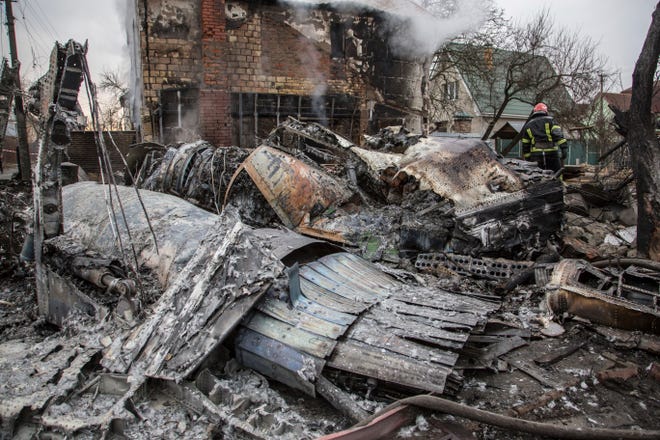The Russian invasion of Ukraine has disrupted the world economy and financial markets. For more than a decade, Russian President Vladimir Putin has assailed the post-Cold War security order. While Putin’s ambitions remain unclear, this conflict has shattered hopes of a strong global economic recovery from the coronavirus.
President Biden said, “Russia alone is responsible for the death and destruction this attack will bring, and the United States and its allies and partners will respond in a united and decisive way.”
We do not know Putin’s priorities:
- Will he be satisfied by a change of the Ukraine government to a Moscow-friendly regime?
- Will he attempt to redraw the international boundaries of Europe?
President Biden and NATO allies need to establish policies that will “contain” Russia’s geopolitical ambitions. We can no longer expect Europe’s national boundaries to remain constant. To counter Russia’s expansionary ambitions, the West will need to ramp up military expenditures.
We are at the initial stages of the conflict, and therefore the measures taken by both Russia and the West will evolve.
For example, Western sanctions on Russia will vary depending upon Russian President Putin’s endgame. To date, we have sanctioned Russian Banks, rich Russian oligarchs and banned exports of high-tech goods. The United States and European allies agreed to remove Russia from the interbank messaging system, SWIFT. SWIFT allows quick international transactions and is used by 11,000 financial institutions in 200 countries.
To counter the West’s sanctions, Putin could unleash cyberattacks. Maurice Obstfeld, professor of economics at the University of California, Berkeley, said, “The threat of a cyberattack may be underrated. Russia could respond to sanctions from the United States with digital retaliation, disrupting digital life at a time when the internet has become central to economic existence. The Russians are the best in the world at this, and we do not know the extent to which they have burrowed into our systems.”
The biggest concern is over disruption to supplies of oil and gas. Because of Europe’s dependence on Russian oil and gas, we have not blocked Russian oil and gas exports. Russia produces 10 million barrels of oil a day, roughly 10% of global demand. The European Union relies heavily on Russian supplies of natural gas (41%) to power plants and provides heat to homes and businesses. Germany is particularly vulnerable, as it has shut down nearly all of its nuclear power stations and aims to eliminate coal by 2030.
Ukraine is a significant producer of uranium, titanium, iron ore, steel, and ammonia. Russia and Ukraine are responsible for nearly 30% of global wheat exports. Economists fear that disruptions in food supply could spur political unrest as far away as Egypt and Indonesia.
Paul Bledsoe, strategic adviser at the Progressive Policy Institute, says, “It has taken the current crisis for Germany and the EU to recognize that its codependence on Russian gas is a geopolitical and climate nightmare from which they must finally awake.”
A perfect storm of energy shortages and supply chain disruptions could cause our economy to go into a serious tailspin. The Atlanta Fed estimated U.S. growth to downshift to 1.3% for the first quarter 2022. This sharply contrasts with our fourth-quarter 7% growth. Ukraine belligerency with possible spillover effects could make it harder for the Federal Reserve to raise rates aggressively.
The most significant outgrowth of Russia’s assault on Ukraine might lead to something more consequential. Specifically, Chinese President Xi Jinping might take military action to reclaim Taiwan, which is much more critical to the global supply chain.
Since the end of the Cold War, the world has benefited from Pax Americana (modeled after Pax Romana). Because of the military and economic hegemony of the United States, the globe has enjoyed relative peace, until now.
Originally published in the Sarasota Herald-Tribune




